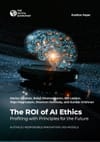⚡ Quick Summary
This position paper reframes AI ethics from a compliance burden into a strategic business investment. By introducing a layered ROI model—spanning direct returns, intangible value, and strategic gain—it argues that ethical AI practices mitigate risk, drive innovation, and create long-term advantage. The paper presents comparative ROI frameworks, real-world case studies, and a proposal for an Ethics Return Engine to quantify these impacts.
🧩 What’s Covered
The report combines conceptual grounding with ROI models and field-tested examples, including:
1. Definitions & Rationale
- Positions AI ethics as a core pillar of ROI, alongside performance and compliance
- Introduces a multi-dimensional ROI formula:
- Direct Value = Risk mitigation + Operational efficiency
- Indirect Value = Brand, trust, and talent
- Strategic Value = Innovation and market leadership
2. ROI Framework Comparison
- Compares traditional ROI, AI ROI, GRC ROI, and Ethical AI ROI
- Highlights how traditional models fail to quantify intangible and long-term risks (e.g. reputation loss, stakeholder harm)
- Presents a detailed table of risks, value components, and time horizons across ROI types
3. Practical Case Studies
- Mastercard: Used Credo AI to operationalize generative AI oversight
- IBM: Built stakeholder trust by embedding ethics into AI lifecycle governance
- OpenAI (Italy): Fined €15M for GDPR noncompliance
- Deutsche Bank & Klarna: Financial losses linked to AI-driven job eliminations
- Watson for Oncology: Demonstrates cost of biased data and ethics failure in health AI
4. Ethics ROI Models & Tools
- Introduces the Holistic Return on Ethics (HROE) and Rolls-Royce Aletheia models
- Calls for more robust ROI calculators that can:
- Quantify trust and stakeholder impact
- Factor in societal and environmental risks
- Guide pre-deployment ethical design
5. Incentives & Regulation
- Maps ROI benefits to AI Act categories (e.g. transparency, oversight, discrimination mitigation)
- Recommends proactive use of ethics assessments as strategic differentiators under regulation
- Stresses urgency in re-aligning corporate incentive structures to favor long-term value over short-term gain
6. Proposed Features of the Ethics Return Engine (ERE)
- Risk-weighted scoring
- Tangible and intangible value metrics
- Realtime dashboards and data persistence
- Future whitepaper teased for methodology
💡 Why it matters?
The paper helps reframe ethics as a value driver—not just a guardrail. It bridges the language gap between ethics professionals and business strategists by grounding ethical AI in cost, risk, brand, and competitive logic. In a policy environment shaped by the EU AI Act and rising stakeholder scrutiny, this resource gives boards and compliance teams a measurable narrative for responsible AI.
❓ What’s Missing
- The proposed Ethics Return Engine (ERE) is not yet implemented—it’s aspirational
- Frameworks like HROE and Aletheia are outlined but lack full methodologies
- The analysis is stronger on conceptual clarity than operational tooling—no fillable templates or step-by-step guides
- Challenges like metric standardization, interdisciplinary ownership, and sector-specific customization are acknowledged but not resolved
👥 Best For
- C-suite & board members seeking to align AI governance with business outcomes
- Policy teams integrating ethics into reporting and regulatory prep
- Sustainability and ESG leads exploring ethics as part of long-term value creation
- AI governance professionals building ROI language for internal buy-in
- Academics or think tanks designing risk-benefit assessment models
📄 Source Details
- Title: The ROI of AI Ethics: Profiting with Principles for the Future
- Authors: Marisa Zalabak, Balaji Dhamodharan, Bill Lesieur, Olga Magnusson, Shannon Kennedy, Sundar Krishnan
- Published by: The Digital Economist, 2025
- Format: 35-page position paper
- Notable frameworks: HROE, Ethical AI ROI formula, Ethics Return Engine
- License: Open-access educational reference
- Contact: info@thedigitaleconomist.com
📝 Special thanks to the entire Digital Economist team for advancing the conversation on AI ethics as a measurable business strategy.


